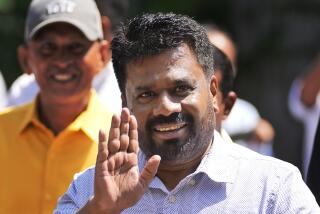South African President Cyril Ramaphosa is reelected by lawmakers for a second term

CAPE TOWN, South Africa — South African President Cyril Ramaphosa was reelected by lawmakers for a second term Friday after his African National Congress party struck a dramatic late deal to forge a coalition with the main opposition and other parties.
Ramaphosa won convincingly in a Parliament vote against surprise nominee Julius Malema, the leader of the far-left Economic Freedom Fighters. Ramaphosa received 283 votes to Malema’s 44 in the 400-member house.
The 71-year-old Ramaphosa secured his second term with the help of lawmakers from the second-largest Democratic Alliance party and others after the ANC lost its 30-year parliamentary majority in a landmark election two weeks ago. The ANC signed an agreement with the DA — a white-led party that had been its fiercest political foe — just hours before the vote for president, ensuring Ramaphosa returned as leader of Africa’s most industrialized economy.
At least two other smaller parties will also be part of the agreement that put South Africa into uncharted waters with the first national coalition government in its democratic history.
“The government of national unity is on track,” ANC Secretary-GeneralFikile Mbalula said. “For the interest of the country, we said let’s work together. We have no fear of that.”
The agreement was necessary after the ANC lost its majority in a humbling national election for the ruling party. It was a turning point for Africa’s most industrialized economy. The ANC is the party of Nelson Mandela and had governed with a comfortable majority since the end of the apartheid system of white minority rule in 1994.
That three-decade dominance ended in the May 29 election, when the ANC’s share of the vote dropped to 40% amid discontent among South Africans over high levels of poverty, inequality and unemployment.
Analysts warn there might be complications ahead given the starkly different ideologies of the ANC, a former liberation movement, and the centrist, business-friendly DA, which won 21% of the vote in the national election, the second-largest share.
The DA disagreed with the ANC government’s move to accuse Israel of genocide in Gaza in a highly sensitive case at the United Nations’ top court. DA leader John Steenhuisen called the coalition agreement a “historic step forward.”
Former President Jacob Zuma’s MK Party was boycotting the Parliament session, which did not affect the voting as only a third of the house is needed for a quorum.
Parliament convened in an unusual setting after a fire in 2022 gutted the National Assembly building in Cape Town and lawmakers came together at a conference center near the city’s waterfront.
Imray and Magome write for the Associated Press. Imray reported from Cape Town, Magome from Johannesburg.
More to Read
Sign up for Essential California
The most important California stories and recommendations in your inbox every morning.
You may occasionally receive promotional content from the Los Angeles Times.










